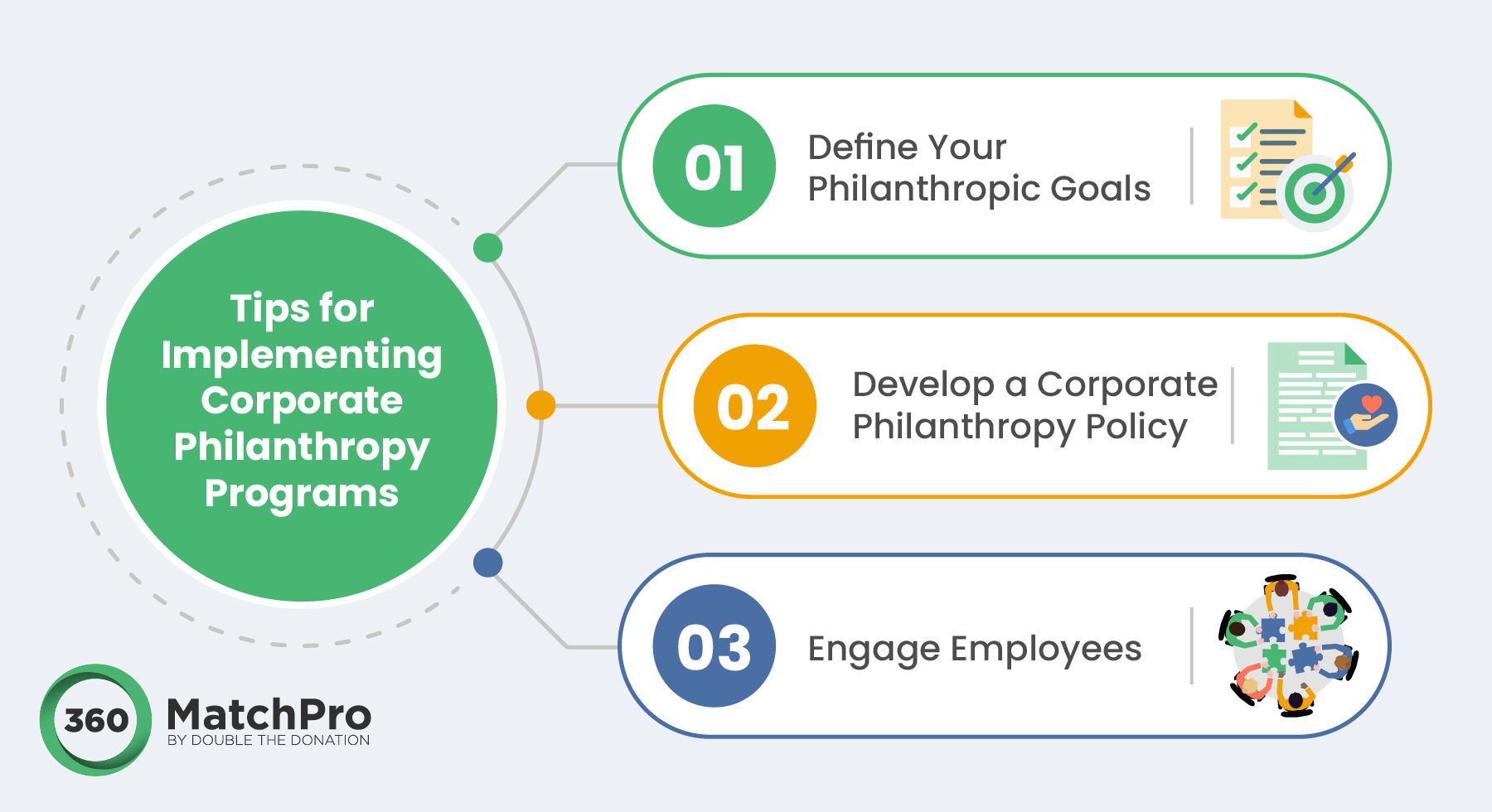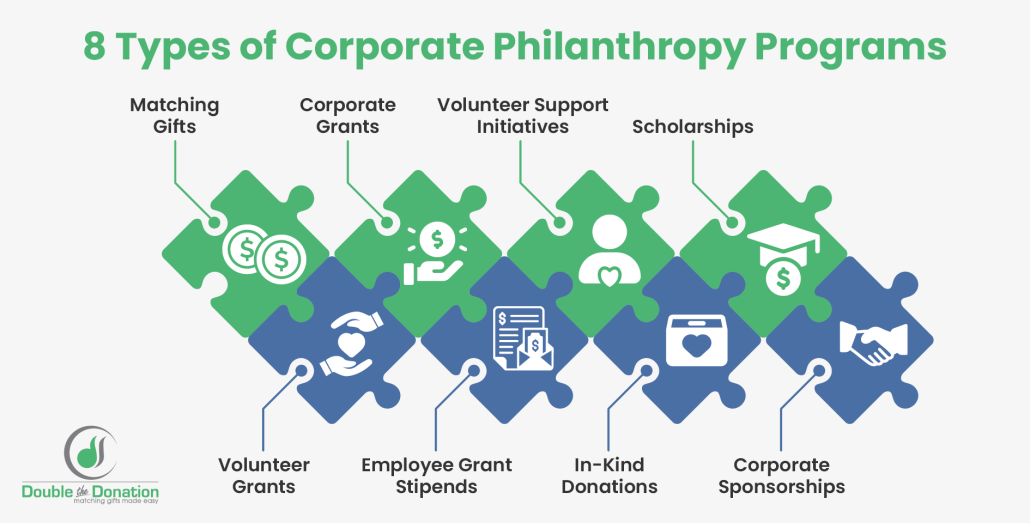How to align corporate philanthropy with your company’s business mission
Why Business Philanthropy Issues: An Overview to Corporate Social Obligation
Company philanthropy offers as a necessary component of company social responsibility. It shows a firm's commitment to social concerns and enhances its public picture. Organizations taking part in kind initiatives often see boosted worker morale and more powerful neighborhood connections. The true impact of these campaigns can be complex and intricate. Recognizing the subtleties of company philanthropy can illuminate its importance in today's service landscape. What are the critical variables that drive its success?
The Definition of Business Philanthropy
Corporate philanthropy describes the philanthropic payments and efforts undertaken by services to support social causes and neighborhood development. This concept encompasses a selection of activities, consisting of financial contributions, employee volunteer programs, and in-kind presents of services or items. Firms involve in philanthropy to deal with social concerns such as education and learning, healthcare, ecological sustainability, and hardship relief.
Usually, company philanthropy is structured via formal programs or collaborations with not-for-profit companies, allowing organizations to leverage their sources properly. These campaigns frequently aim to make a favorable impact on the community while lining up with the company's values and goal. Furthermore, corporate philanthropy shows a dedication to business social obligation, showcasing exactly how businesses can add to society past revenue generation. By getting involved in philanthropic efforts, companies can play a significant role in cultivating social adjustment and resolving neighborhood needs.
Advantages of Corporate Philanthropy for Organizations
Involving in corporate philanthropy deals various benefits for companies, boosting their online reputation and promoting more powerful neighborhood connections. Companies that proactively take part in kind efforts typically experience increased worker morale and loyalty. When staff members perceive their company as socially responsible, they are more probable to feel proud of their work environment, leading to higher degrees of work fulfillment and retention.
Corporate philanthropy can produce useful networking opportunities. Working together with non-profits and neighborhood companies permits companies to get in touch with similar individuals and groups, potentially causing partnerships that can profit both events. Furthermore, organizations took part in philanthropy may locate themselves much more attractive to capitalists and stakeholders who prioritize honest methods.
Inevitably, business philanthropy not only supports social requirements yet additionally gives tangible advantages to businesses, creating a win-win scenario that promotes growth and sustainability while contributing positively to the world.
Enhancing Brand Name Commitment Via Social Duty
Enhancing brand name commitment via social duty entails structure trust fund with customers by straightening company activities with neighborhood values (corporate philanthropy). Business can promote deeper connections via area involvement initiatives that reverberate with their target market. In addition, genuine brand storytelling can better enhance commitment by showcasing authentic commitment to social causes
Structure Depend On With Action
Structure depend on with action is an effective method that firms can implement to reinforce brand commitment and foster deeper links with consumers. When businesses proactively involve in company philanthropy, they demonstrate a commitment to moral techniques and social obligation. This proactive strategy not only enhances their reputation yet likewise resonates with consumers that prioritize worths positioning. Transparency in kind efforts is vital; firms should effectively connect their efforts and the influence they are making. Authenticity plays a significant duty as well; customers are much more most likely to support brand names that genuinely appreciate societal concerns rather than those that involve in superficial advertising and marketing. Ultimately, by focusing on meaningful activities over mere words, business can support enduring count on and commitment among their client base.
Area Engagement Efforts

Genuine Brand Name Narration
Area involvement campaigns often serve as a structure for genuine brand storytelling, which plays a considerable role in growing brand name commitment. By sharing authentic narratives about their social duty initiatives, firms can attach psychologically with customers. These tales highlight the brand name's worths, goal, and dedication to societal enhancement, fostering count on and relatability. They are a lot more most likely to establish a deeper fondness and preference for it when consumers perceive a brand name as socially accountable - corporate philanthropy. Authentic storytelling additionally motivates transparency, inviting customers to engage with the brand on an individual degree. Because of this, businesses not just improve their track record but also construct enduring relationships with their target market, eventually leading to raised loyalty and advocacy in an open market
The Function of Employees in Business Philanthropy
Employees play an essential duty in forming a firm's kind initiatives with their engagement and participation. Efficient worker engagement approaches can improve volunteerism, resulting in purposeful neighborhood influence. As organizations harness the cumulative power and passion of their labor force, they can foster a society of considering that prolongs past the work environment.
Staff Member Interaction Approaches
Interaction in company philanthropy fosters a sense of objective that extends past plain profit-making. Companies can improve staff member involvement by carrying out various approaches that encourage involvement in kind initiatives. One reliable technique is to develop a matching present program, where the company matches staff member contributions to eligible charities, amplifying their effect. In addition, normal communication regarding humanitarian initiatives can develop awareness and inspire workers to add their time and sources. In addition, providing platforms for workers to share their charitable rate of interests cultivates a feeling of possession and area. Recognizing and rewarding employees for their philanthropic contributions can also reinforce a culture of offering, inevitably bring about i loved this an extra involved labor force lined up with the business's social obligation goals.
Volunteerism and Community Impact
Corporate philanthropy thrives when people proactively join volunteerism, straight influencing the communities they serve. Staff member participation in volunteer efforts not only enhances firm society however likewise fosters a feeling of objective and connection among staff. Via offering, employees develop important abilities, such as synergy and leadership, which can translate into improved job efficiency. In addition, when workers unite for area causes, they strengthen their bond with the organization, improving general morale and website here commitment. Organizations that urge volunteerism often see a favorable public picture, as area involvement reflects their commitment to social obligation. Ultimately, the collective impact of employee volunteer initiatives can transform neighborhoods, dealing with pushing social concerns while strengthening business worths and goal.

Measuring the Influence of CSR Initiatives
As companies increasingly purchase company social responsibility (CSR) initiatives, comprehending their impact ends up being important for reviewing efficiency and directing future efforts. Measuring the impact of CSR calls for a diverse strategy, including both quantitative and qualitative metrics. Secret performance signs (KPIs) such as area involvement degrees, worker fulfillment, and environmental improvements offer important insights into the outcomes of CSR programs. Surveys and meetings with stakeholders can expose the social modification produced by these campaigns, while data evaluation assists track progress versus set objectives.
Lining up CSR goals with business purposes boosts accountability. Organizations can utilize structures such as the International Coverage Initiative or the UN Sustainable Advancement Goals to standardize their measurement procedures. Inevitably, precise analysis of CSR initiatives not only demonstrates a firm's dedication to social duty but additionally informs method modifications to make best use of positive impact, cultivating a society of sustainability and area interaction.
Best Practices for Implementing Effective CSR Strategies
Executing efficient CSR strategies calls for a clear understanding of an organization's values and objectives, ensuring alignment with stakeholder assumptions. Successful business start by carrying out a thorough analysis of their social, environmental, and financial effects, permitting them to identify locations for enhancement. Stakeholder interaction is important; companies must proactively involve staff members, customers, and area participants in the development and execution of CSR efforts.
Openness is an additional finest technique, as it fosters depend on and responsibility. Companies must connect their CSR objectives and progression honestly, sharing both successes and obstacles. Additionally, incorporating more CSR right into the core service technique enhances its influence, making it an essential component of procedures instead than an afterthought. Normal analysis and adaptation of CSR efforts, educated by stakeholder comments and transforming societal demands, warranty relevance and efficiency. By adhering to these practices, companies can create lasting and significant CSR strategies that reverberate with their communities.
Regularly Asked Concerns
Just How Can Local Business Take Part in Corporate Philanthropy?
Small organizations can take part in business philanthropy by giving away a percentage of revenues, funding local events, partnering with nonprofits, using staff member volunteer days, and participating in neighborhood solution tasks, fostering a positive effect and boosting their brand name credibility.
What Prevail False Impressions About Business Philanthropy?
Typical false impressions about corporate philanthropy include the belief that it's exclusively an advertising and marketing tool, that just big business can get involved, and that it does not have real influence. Numerous take too lightly the worth tiny services can add via purposeful engagement.
How Do Customers Perceive Business Taken Part In Philanthropy?
Customers usually view companies participated in philanthropy positively, associating such initiatives with company duty, moral actions, and area assistance. This assumption can improve brand name loyalty, influence acquiring decisions, and improve overall corporate credibility in the marketplace.
Are There Tax Obligation Advantages for Services Associated With Philanthropy?
Companies entailed in philanthropy usually appreciate numerous tax benefits, such as reductions for philanthropic contributions. corporate philanthropy. These incentives can boost a business's financial standing while advertising a favorable public image through their area interaction efforts
Can Corporate Philanthropy Improve Staff Member Retention Fees?
Corporate philanthropy can boost worker retention rates by cultivating a sense of purpose and belonging amongst staff. Involved workers, aligned with business values, are more probable to remain fully commited and satisfied within their duties.
Business philanthropy offers as an important element of corporate social responsibility. Corporate philanthropy refers to the charitable contributions and initiatives undertaken by services to support social causes and area advancement. Additionally, company philanthropy reflects a dedication to corporate social obligation, showcasing just how companies can add to culture beyond earnings generation. Engaging in business philanthropy deals numerous advantages for organizations, enhancing their track record and fostering stronger neighborhood connections. Consumers typically watch companies engaged in philanthropy favorably, associating such efforts with business duty, ethical behavior, and neighborhood assistance.